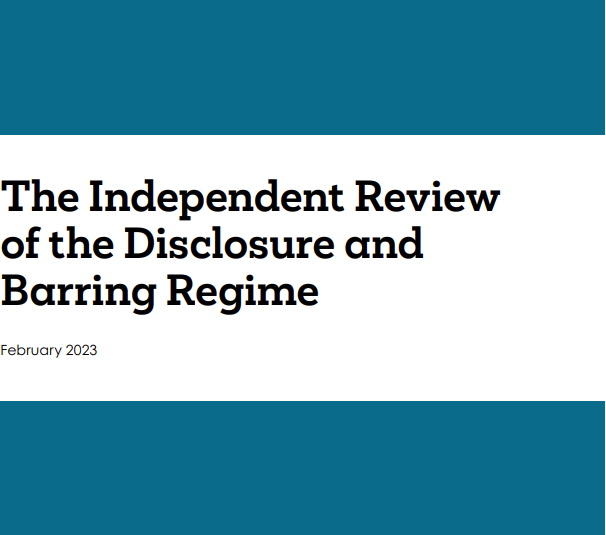What we’ve learned from the Independent Review of the Disclosure and Barring Regime
The Independent Review of the Disclosure and Barring Regime was announced by the Home Office on 24 February 2022 as part of the government’s strategy to tackle violence against women and girls.
The review was expected to be completed in Summer 2023 but was completed early and published last month. The review contains a series of recommendations aimed at improving the current system and addressing potential vulnerabilities.
The goal of the review is to identify what can be done to enhance the safety and security of children and vulnerable adults while also ensuring that the disclosure and barring processes remain fair and efficient.
Below we’ll take a look at each of the recommendations in more detail:
Recommendation 1: Amendment to the definition of regulated activity
The review recommends removing the exemption for supervised activity from the definition of regulated activity relating to children.
This change acknowledges that individuals with close contact with children, even if supervised, can potentially exploit these relationships outside the workplace.
By amending the definition, decision-makers assessing the suitability of individuals for such roles will have access to the barred list, thus aligning with the IICSA Recommendation 9 for greater use of the barred list.
Recommendation 2: Redrafting the definition of regulated activity
The complexity of the current definition of regulated activity has been recognized as a significant challenge for those who must apply it. While the review does not suggest altering the meaning of the definition, it does recommend considering amendments to make it more easily understood by those applying it. This task will likely be assigned to experts in parliamentary drafting.
Recommendation 3: Aid workers and Enhanced DBS Checks
The review recommends amending the legislation governing enhanced checks with barred lists checks to make aid workers, who are nationals or residents here and whose contracts are made here, eligible for such checks. This change would ensure that those working with aid beneficiaries overseas undergo the same level of scrutiny as those working domestically.
Recommendation 4: The self-employed
The review has identified a vulnerability in the current safeguarding regime due to the ineligibility of self-employed individuals to apply for an enhanced certificate with barred list check. To address this issue, the review recommends that self-employed individuals, whether paid or unpaid, working with children or vulnerable adults, should be eligible to apply for an enhanced DBS certificate with the relevant barred list(s) check.
Recommendation 5: Local councillors
The review recommends making enhanced criminal record checks mandatory for all councillors in Unitary and Upper Tier Authorities who are being considered for appointment to any committee involved in decisions on the provisions of children's services or services for vulnerable adults. In the meantime, authorities are encouraged to adopt this procedure as best practice pending legislation.
Recommendation 6: Door supervisors
The review recommends making enhanced DBS checks together with barred lists checks mandatory for applicants for the grant or renewal of a door supervisor's licence. This recommendation stems from the potential risk to both adults and children posed by encounters with door supervisors, warranting the extra level of safeguarding provided by enhanced DBS checks together with barred lists checks.
Recommendation 7: Close protection licences
The review also recommends making enhanced DBS checks together with children's barred list checks mandatory for applicants for the grant or renewal of a close protection licence. This change aims to provide an extra level of safeguarding for children who may come into contact with close protection license holders.
Recommendation 9: The Update service
The review recommends that the DBS carries out the work necessary to establish the feasibility and cost of redesigning the Update service to enable employers to receive notification of any change to the status of a certificate. This would require permission from the certificate holder but would help mitigate vulnerabilities arising from changes in certificate status after issuance.
Conclusion
By implementing these recommendations, the UK can enhance its safeguarding regime for children and vulnerable adults, ensuring that those working in regulated roles undergo thorough background checks and are appropriately vetted.
These proposed changes will also streamline the disclosure and barring process, making it more efficient and user-friendly for both applicants and employers.
Employers and HR professionals should pay close attention to these recommendations, as they may soon impact background screening practices and the hiring process for roles involving children and vulnerable adults.
However, it will likely take years for all these recommendations to be introduced. They are unlikely to impact employers in the short term.
Employers should view this as an opportunity to review and update their own policies, ensuring that they are comprehensive, compliant, and effective in promoting the safety and well-being of those they serve.


